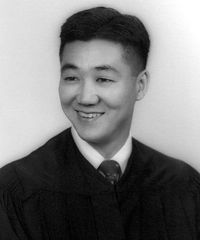James K. Okubo
James K. Okubo | |
|---|---|
 Technician James Okubo | |
| Place of burial | Woodlawn Cemetery, Detroit, Michigan |
| Allegiance | United States of America |
| Service | United States Army |
| Rank | Technician Fifth Grade |
| Unit | 442nd Regimental Combat Team |
| Battles / wars | World War II |
| Awards | Medal of Honor Silver Star |
| Other work | Dentist Faculty, University of Detroit[1] |
James K. Okubo (May 30, 1920 – January 29, 1967) was a United States Army soldier and posthumous recipient of the Medal of Honor for his actions in World War II.
Biography
On October 28, 1944, Okubo was a technician fifth grade serving as a combat medic in the 442nd Regimental Combat Team. During a battle on that day and the following day, in the Foret Domaniale de Champ near Biffontaine, France, he carried wounded soldiers to safety and treated over two dozen men despite intense enemy fire. One week later, on November 4, he again braved enemy fire to rescue a man from a burning tank. For his actions, Okubo was recommended for the Medal of Honor, but was instead given the Silver Star under the mistaken belief that medics were not eligible for higher awards.
Okubo left the Army while still a technician fifth grade. He died at age 47 in a traffic collission,[1][2] and was buried in Woodlawn Cemetery, Detroit, Michigan.[citation needed]
Okubo was interned with his family at the Tule Lake War Relocation Center.[3]
A 1990s review of service records for Asian Americans who were decorated in World War II led to Okubo being awarded the Medal of Honor. In a ceremony at the White House on June 21, 2000, his surviving family was presented with his Medal of Honor by President Bill Clinton. Twenty-one other Asian Americans also received the medal during the ceremony, all but seven of them posthumously.[4]
Medal of Honor citation
Okubo's official Medal of Honor citation reads:
Technician Fifth Grade James K. Okubo distinguished himself by extraordinary heroism in action on 28 and 29 October and 4 November 1944, in the Foret Domaniale de Champ, near Biffontaine, eastern France. On 28 October, under strong enemy fire coming from behind mine fields and roadblocks, Technician Fifth Grade Okubo, a medic, crawled 150 yards to within 40 yards of the enemy lines. Two grenades were thrown at him while he left his last covered position to carry back wounded comrades. Under constant barrages of enemy small arms and machine gun fire, he treated 17 men on 28 October and 8 more men on 29 October. On 4 November, Technician Fifth Grade Okubo ran 75 yards under grazing machine gun fire and, while exposed to hostile fire directed at him, evacuated and treated a seriously wounded crewman from a burning tank, who otherwise would have died. Technician Fifth Grade James K. Okubo's extraordinary heroism and devotion to duty are in keeping with the highest traditions of military service and reflect great credit on him, his unit, and the United States Army.
Legacy
In 2002, a medical clinic was named after him in Fort Lewis.[6][7]
In 2003, the United States Army named the barracks near Brooke Army Medical Center after Okubo in a ceremony which featured his widow.[8] The barracks are now used for Fort Sam Houston's Warrior Transition battalion.[9][10]
See also
{{{inline}}}
References
- ^ a b c Mia Penta (6 April 2001). "Japanese American Soldiers Celebrated". Asian Week. Retrieved 6 December 2009.
- ^ Gregg K. Kakesako (15 September 2009). "AJA medic's medal may be upgraded". Honolulu Star-Bulletin. Retrieved 6 December 2009.
- ^ "National Archives: James Okubo". Retrieved 2010-04-30.
- ^ Williams, Rudi (May 19, 2000). "21 Asian American World War II Vets to Get Medal of Honor". American Forces Press Service. Retrieved 2007-11-20.
- ^ "Medal of Honor Recipients - World War II (M-S)". Medal of Honor Citations. U.S. Army Center of Military History. June 8, 2009. Retrieved 2007-11-20.
- ^ "Fort Lewis clinic named after Okubo". International Examiner. 19 March 2002. Retrieved 6 December 2009.
- ^ "OKUBO HEALTH CLINIC". Madigan Army Medical Center. United States Army. 5 May 2009. Retrieved 6 December 2009.
- ^ Steve Finley (June 2003). "Barracks Dedicated to James K. Okubo". Newsletter. The NVC Foundation. Retrieved 6 December 2009.
- ^ Cheryl Harrison (13 September 2007). "Barracks renovations ease daily living for wounded warriors". IMCOM. United States Army. Retrieved 6 December 2009.
- ^ Sig Christenson (7 September 2009). "Wounded GIs get round-the-clock care". San Antonio Express-News. Hearst Newspapers. Retrieved 6 December 2009.
External links
- James K. Okubo at Find a Grave Retrieved on 2007-11-20
